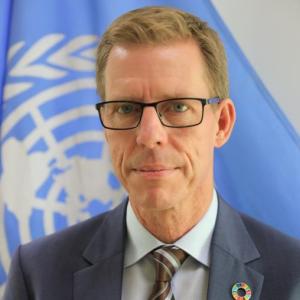This year's World Population Day calls for global attention to the unfinished business of the 1994 International Conference on Population and Development. This was the first time that governments across the globe, including in Jordan, recognized that reproductive health and gender equality are a critical part of achieving sustainable development.
In the 25 years that have passed since 1994, many achievements have been made in regard to access to reproductive health services that have resulted in better quality of care for mothers around the world. It has raised awareness on the need to address issues that were previously taboo such as combatting gender based violence. And the world has recognized that without investment in half its 7.2 billion people, it will be impossible to reduce the inequalities that are hindering development.
Prior to 1994, the world’s population was growing at a rate that many experts thought to be problematic for the aspirations of nations seeking to develop their people and economies.
What began as a discussion about population targets then shifted and put the needs and aspirations of people at the center of sustainable development. With this paradigm shift, 179 governments adopted the visionary Programme of Action and agreed that putting people first, empowering women, and enabling people to freely decide the timing and spacing of their pregnancies would clear the way to sustainable development.
The gains made since then are remarkable:
In 1994, only about 15 per cent of married women in the least developed countries used a modern contraceptive. Today, 37 per cent do.
Twenty-five years ago, in the least-developed countries, nearly eight in 1,000 women died during pregnancy or childbirth. Today, that rate has been cut in half.
A woman in a least-developed country 25 years ago had nearly six children. Today she has fewer than four.
If we compare these gains to Jordan, we find that the investments in reproductive health are similarly positive at the national level including in comparison to those countries in the region. Maternal mortality is 19/100,000 births. Nearly 100% of deliveries are made in a health facility with qualified staff and infant mortality is at an all time low. These strides show definite commitment to ensuring that each person born in Jordan gets the best start to life and so does his/her mother-something that many countries in the world cannot claim.
Despite this success, we still have a long way to go before we can claim to have lived up to the commitments pledged in Cairo. Specifically, the gains regarding gender equality, especially for young women, have been uneven. Women still feel they need to choose between a career and family life. The latest Demographic and Health Survey, 2017, shows that the most vulnerable girls, nearly one in ten and even higher for refugees, are still subject to being married under 18. Over ¾ of qualified women are outside the formal labor force.
This is an occasion to celebrate 50 years of UNFPA’s work with its partnership as part of the UN family, and in collaboration with the many dedicated partners who have worked hard to create awareness about how choices and opportunities have changed for girls and women.
As we go forward, it is also imperative that we need to accelerate these efforts to achieve these unmet goals related to reproductive health and rights that are critical to Jordan and the world at large.
You, Jordan’s vibrant young, represent not only the present but also the hope and the future of the country. The energy we see here on the symbol of Jordan’s heritage, the Citadel, is the clearest sign of commitment to ensuring that this generation – the generation of technology, health and prosperity- will shape Jordan with greater equality and prosperity. You have a choice, and a responsibility and all the support from the UN, to ensure your voice is heard and contributes to positive change.
On this World Population Day, we, as the UN and its partners, advocate from around the world, and specifically here in Jordan, calling on our leaders, policymakers, grassroots organizers, institutions and others to help make reproductive health and rights a reality for all.






